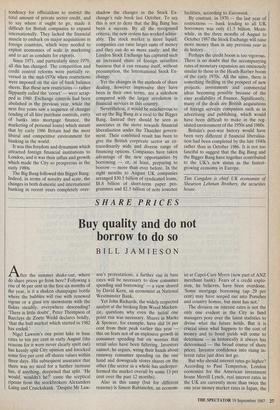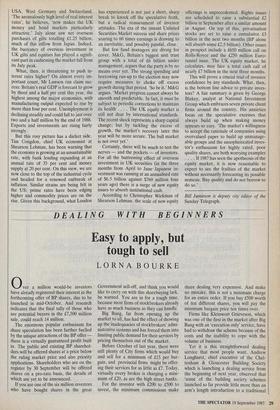SHARE PRICES
Buy quality and do not borrow to do so
BILL JAMIESON
After the summer shake-out, where do share prices go from here? Following a rise of 46 per cent in the first six months of the year, is it a shaken champagne bottle where the bubbles will rise with renewed vigour or a glass toy snowstorm with the flakes steadily, everywhere descending? `There is little doubt', Peter Thompson of Barclays de Zoete Wedd declares boldly, `that the bull market which started in 1982 has ended.'
Nigel Lawson's one point hike in base rates to ten per cent in early August (the reasons for it were never clearly spelt out) has keenly split City opinion and knocked some five per cent off shares values within three days. His subsequent assurance that there was no need for a further increase has, if anything, deepened that split. He would, wouldn't he?' came the sceptical riposte from the stockbrokers Alexanders Laing and Cruickshank. 'Despite Mr Law- son's protestations, a further rise in base rates will be necessary to slow consumer spending and borrowing' — a view shared by David Kern, an economist at National Westminster Bank.
Yet John Richards, the widely respected analyst at the broking firm Wood Macken- zie, questions why even the initial one point rise was necessary. Shares in Marks & Spencer, for example, have slid 16 per cent from their peak earlier this year this on fears not of an explosive growth in consumer spending but on worries that retail sales have been faltering. Investors cannot, he argues, wring their hands about runaway consumer spending on the one hand and downgrade stores shares on the other (the sector as a whole has underper- formed the market overall by some 13 per cent over the past 12 months).
Also in this camp (but for different reasons) is Simon Rubinsohn, an econom- ist at Capel-Cure Myers (now part of ANZ merchant bank). Fears of a credit explo- sion, he believes, have been overdone. `Some mortgage borrowing (up 29 per cent) may have seeped out into Porsches and country homes, but most has not.'
The division on interest rates is not the only one evident in the City as fund managers pore over the latest statistics to divine what the future holds. But it is crucial since what happens to the cost of money and to bond yields will come to determine — as historically it always has determined — the broad course of share prices. Investor confidence into rising in- terest rates just does not go.
But why should interest rates go higher? According to Paul Temperton, London economist for the American investment house Merrill Lynch, real interest rates in the UK are currently more than twice the one year money market rates in Japan, the USA, West Germany and Switzerland. `The anomalously high level of real interest rates', he believes, 'now makes the UK money and bond markets particularly attractive.' July alone saw net overseas purchases of gilts totalling £1.25 billion, much of this inflow from Japan. Indeed, the buoyancy of overseas investment in UK gilts and equities has played a signifi- cant part in cushioning the market fall from its July peak.
What, then, is threatening to push in- terest rates higher? On almost every im- portant count, Mr Lawson can claim suc- cess: Britain's real GDP is forecast to grow by three and a half per cent this year, the highest among the major economies, with manufacturing output expected to rise by more than four per cent. Unemployment is declining steadily and could fall to just over two and a half million by the end of 1988. Exports and investments are rising fairly strongly.
But this rosy picture has a darker side. Tim Congdon, chief UK economist at Shearson Lehman, has been warning that the economy is growing at an unsustainable rate, with bank lending expanding at an annual rate of 35 per cent and money supply at 20 per cent. On this view, we are now close to the top of the industrial cycle and headed for a renewed outbreak of inflation. Similar strains are being felt in the US: prime rates have been edging higher and commodity prices are on the rise. Given this background, what London has experienced is not just a short, sharp break to knock off the speculative froth, but a radical reassessment of investor attitudes. The era of the instant Unlisted Securities Market success and share prices soaring to 60 times earnings is drawing to an inevitable, and possibly painful, close.
But few fund managers are diving for cover. M&G, Britain's biggest unit trust group with a total of £6 billion under management, argues that the party is by no means over yet. The strong spending and borrowing run-up to the election may now require measures to choke off excess growth during that period. 'So be it,' M&G argues. 'Market progress cannot always be smooth and predictable. In fact, it must be subject to periodic corrections to maintain its health . . . . The UK equity market is still not dear by international standards. The recent shock represents a sharp capital change; but by tackling the excess of growth, the market's recovery later this year will be more secure. The bull market is not over' yet.'
Certainly, there will be much to test the nerves — and the pockets - of investors. For all the buttressing effect of overseas investment in UK securities (in the three months from April to June. Japanese in- vestment was running at an annualised rate of $6.5 billion against $769 million four years ago) there is a surge of new equity issues to absorb institutional cash.
According to Christopher Wickman of Shearson Lehman, the scale of new equity offerings is unprecedented. Rights issues are scheduled to raise a substantial £2 billion in September after a similar amount in August. On top of this, privatisation stocks are set to raise a cumulative £3 billion in the next two months (BP alone will absorb some £2.5 billion). Other issues in prospect include a £650 million call on Rolls-Royce and the £250 million Euro- tunnel issue. The UK equity market, he calculates, may face a total cash call of nearly £7 billion in the next three months.
This will prove a crucial trial of investor confidence by any standards. What, then, is the bottom line advice to private inves- tors? A fair summary is given by George Blakey, analyst at National Investment Group which embraces seven private client firms around the country. His anxieties focus on the speculative excesses that always build up when making money appears so easy. 'The market's willingness to accept the rationale of companies using overvalued paper to build up unmanage- able groups and the unsophisticated inves- tor's enthusiasm for highly rated, poor quality shares, are both worrying examples . . . If 1987 has seen the apotheosis of the equity market, it is now reasonable to expect to see the frailties of the market without necessarily forecasting its possible nemesis. Buy quality and do not borrow to do so.'
Bill Jamieson is deputy city editor of the Sunday Telegraph.



































































 Previous page
Previous page